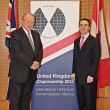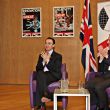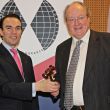“We share a commitment to commemorate the victims of the Holocaust and to honour those who stood against it.”
-- Declaration of the Stockholm International Forum on the Holocaust
 INTERNATIONAL HOLOCAUST REMEMBRANCE ALLIANCE
INTERNATIONAL HOLOCAUST REMEMBRANCE ALLIANCE
“We share a commitment to commemorate the victims of the Holocaust and to honour those who stood against it.”
-- Declaration of the Stockholm International Forum on the Holocaust
Handover
It is a great honour to have assumed the chairmanship of IHRA for 2014/15 on behalf of the United Kingdom. Seventy years after the end of WWII will be a time for deep reflection on the terrible events of the Holocaust, the profound repercussions after the War in Europe, Israel and far across the globe and the implications for the way we educate our young people and develop ways of combatting prejudice, hate speech and incitement to violence in our own societies.
I want to pay tribute to Dr Mario Silva and his Canadian team for the modernising leadership he has given to IHRA. I was glad to do this in person at the handover ceremony at the British Embassy in Berlin last month in front of a large gathering of the diplomatic corps, German officials and leading NGOs and the Hungarian delegation who are preparing to assume the chairmanship next year.
As always IHRA owes a huge debt to the skill and hard work of Dr Kathrin Meyer and her colleagues in the Permanent Office. Our first weeks in the chair have been spent preparing for a really substantive Plenary week in London in May. Some of this year's priorities are set out in the “White Paper” I presented during the handover ceremony in Berlin.
Although I am currently writing this from the Andaman Sea (after a fascinating visit to Myanmar including to the beautiful Synagogue in Rangoon), I shall on my return go immediately into further preparatory meetings with Working Group Chairs and Troika colleagues to flesh out the agenda and decisions that will be presented at IHRA's London Plenary meeting in May. To be successful and effective IHRA needs a vigorous dialogue between government representatives and the wider community of experts, academics, survivors, educators, curators and administrators who have built up such a deep experience of Holocaust issues. And I hold it to be very important that this non-official community of experts should have ample time to network among and inspire each other.


 Click on one of the images to view the gallery (5 images).
Click on one of the images to view the gallery (5 images).Parliamentary interest in UK
I am particularly grateful for the support I get from the members of the UK delegation who will I hope be out in force at our plenary events in May. Our chairmanship has evoked wide parliamentary interest in the UK. A debate was mounted in the House of Lords in the same week we took over with support for IHRA matched by a keen desire to resolve other outstanding consequences of the Holocaust Era such as property restitution, social welfare and recognition of the impact of the Roma genocide. For those interested do read the debate at http://www.publications.parliament.uk/pa/ld201314/ldhansrd/text/140227-gc0001.htm#14022777000345
Genocide Prevention and Mass Atrocities
Immediately after the handover I flew to Costa Rica where I joined Professor Yehuda Bauer (and notably our Argentinian colleague, Head of Delegation Frederico Villegas Beltran) at the first international meeting of “Global Action Against Mass Atrocity Crimes” (GAAMAC) which was held on 4-6 March in San José under Swiss and Costa Rican chairmanship and the auspices of Argentina, Costa Rica, Denmark, Switzerland and Tanzania.
GAAMAC is a support platform created in March 2013 by states engaged in the fields of both the prevention of genocide (GP) and the responsibility to protect (R2P), with the participation of the UN Office of the Special Advisor on the Prevention of Genocide. The purpose is to strengthen and support all governmental efforts in the field of prevention of mass atrocity crimes (war crimes, crimes against humanity, genocide, ethnic cleansing) and to discuss good practice, share learning and explore ways to strengthen their commitment at the national level.Much of this work is inspired by the 2004 International Stockholm Declaration on Genocide Prevention which grew out of the same concerns that inspired the 2000 Stockholm Declaration on Holocaust Education, Remembrance and Research. Yehuda spoke movingly and perceptively as always in his key note speech to GAAMAC as always. I was glad of an opportunity to hammer home the importance of IHRA’s work on education and remembrance. Genocides rarely come out of the blue and there is much scope for an enhanced dialogue between those of us focused on understanding and teaching about the Holocaust and those, in particular the so-called national focal points, who are trying to build up national resilience to mass atrocities.
Photo: IHRA Chair Sir Andrew Burns, Special Envoy Mo Bleeker, Conference Co-Chair and Head of Task Force for dealing with the past and prevention of atrocities in the Directorate of Political Affairs at the Swiss Federal Department of Foreign Affairs, and IHRA Honorary Chairman Yehuda Bauer. Photo courtesy of Frederico Villegas Beltran.
Observers
Immediately after the handover in Berlin I held a number of briefings in London for the Embassies of countries that are not yet members of the IHRA. I explained a bit about the organisation and talked about our priorities during the UK Chairmanship. I was pleased to see so many government representatives from non-member countries coming along. I am in discussion with our five current observers but I was also pleased to have the opportunity to hold discussions with Australia, El Salvador, Albania and others.
FRC
My deputy, Sue Breeze, has been chairing the review of over 40 grant applications to IHRA's Grant Programme. This is heroic work given the range, detail and enthusiasm of the applications. We hope to be able to notify applicants of the funding decisions in April.